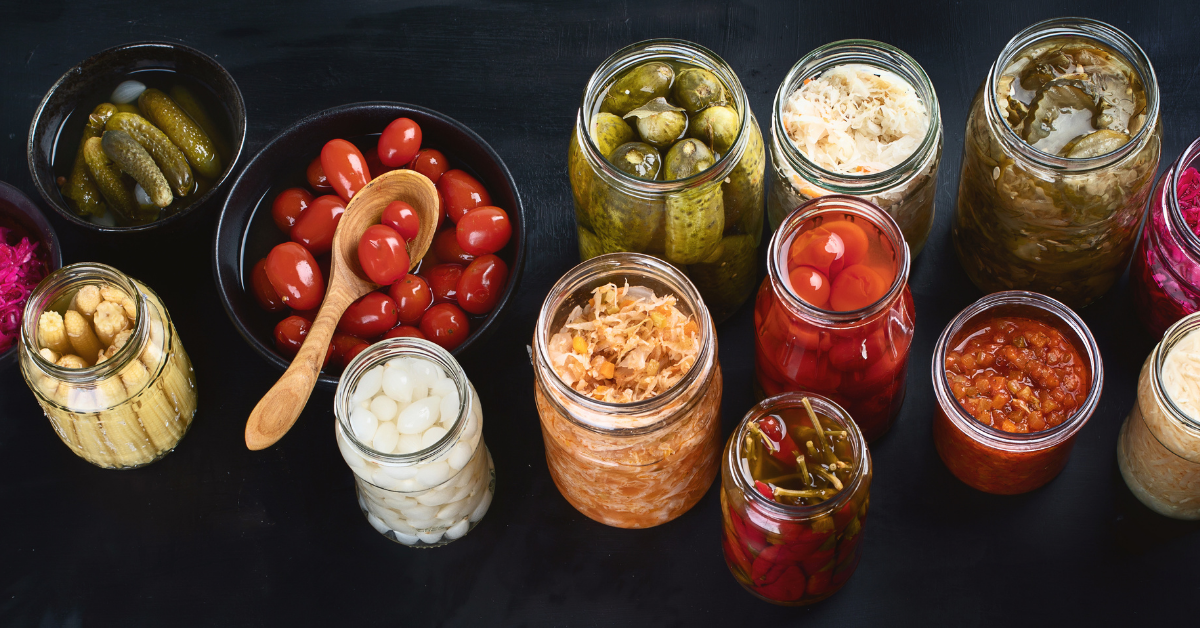While browsing a local farmer’s market some years ago, I came across a brightly lettered poster that enthusiastically invited all comers to “Explore Fermentation! Free workshop today. Learn to make fermented foods, and much more!” At the time, having only the vaguest notion of what a fermented food might be, and little interest in learning more, I passed.
Fast forward to today, when my kitchen counters are strewn with mason jars of vegetables submerged in bubbly, salty water, as invisible microorganisms busily work their lacto-fermentation magic. After a waiting period of anywhere from a few days to months, this process, assuming all goes according to plan, results in delicious fermented foodstuffs such as sauerkraut, kimchi, hot sauce and assorted pickles. [For a more scientific explanation of how it all works, click here.]
Though humans have been experimenting with fermentation since the Neolithic era, fermented foods are becoming increasingly mainstream as awareness spreads of their many associated health benefits, including better gut health and reduced inflammation. At a time when consumers are more hyper-focused on wellness than ever before, the market for fermented foods, as well as the ingredients and tools to produce them, is anticipated to continue expanding rapidly.
Health benefits aside, fermentation is an excellent way to extend the lifespan of produce. After my summer garden produced a bumper crop of cherry bomb peppers, I struggled to figure out how to use them up before they went to soft, wrinkly waste. The answer? DIY hot sauce! Armed with a recipe from Fiery Ferments: 70 Stimulating Recipes for Hot Sauces, Spicy Chutneys, Kimchis with Kick, and Other Blazing Fermented Condiments by fermenting gurus Kirsten K. Shockey and Christopher Shockey, I chopped up my vegetables (tip: do not forget to wear gloves when slicing hot peppers!), immersed them in brine and ignored them for a couple of weeks while the microorganisms did their thing. I then blended my ferment into a tasty batch of flaming orange hot sauce. Success!
I was admittedly a little intimidated as I prepared for my first foray into fermentation. (If only I had taken that free workshop years ago!) Happily, a wealth of resources exist to guide even the most amateur would-be fermenter through the process, including dedicated Facebook groups, subreddits, online classes, and of course, lots of books! We’ve listed some of our favorites below; as always, please email us with your recommendations!
Wild Fermentation and The Art of Fermentation by Sandor Katz
Katz is a world-renowned “fermentation revivalist,” whose own interest in fermentation was born of his overlapping interests in cooking, nutrition and gardening. After publishing his first book, Wild Fermentation (2003), he began teaching fermentation workshops around the globe, demystifying the ancient process. His follow-up book, The Art of Fermentation (2012) won a James Beard Award, and he was dubbed “one of the unlikely rock stars of the American food scene,” by the New York Times. According to his website, Katz has AIDS and considers fermented foods an important part of his healing process. His upcoming book, Sandor Katz’s Fermentation Journeys, is due for release Oct. 21 and available for preorder.
The Noma Guide to Fermentation by Ren Redzepi and David Zilber
In The Noma Guide to Fermentation (2018), Redzepi, chef and co-owner of Copenhagen’s renowned Noma restaurant, and Zilber, head of the restaurant’s fermentation lab, share the techniques used to achieve the famous flavor profiles that earned Noma recognition as the world’s best restaurant on numerous occasions. An indispensable guide for home cooks and pro chefs alike, the book includes hundreds of step-by-step photos and illustrations explaining how fermentation works and why it tastes good, as well as over 100 meticulously written recipes.
Fermented Vegetables and the aforementioned Fiery Ferments by Kirsten K. Shockey and Christopher Shockey
Beginner-friendly fermenting guides full of easy and healthy recipes that incorporate a wide range of vegetables. (The AuthorPods Test Kitchen made a slightly modified version of Habañero Hot Sauce from Fiery Ferments that earned positive reviews from all tasters.) The Shockeys also offer online fermentation classes at fermentationschool.com.
The Farmhouse Culture Guide to Fermenting by Kathryn Lukas and Shane Peterson
Lukas, founder of California-based Farmhouse Culture fermented food and beverage brand, and Peterson, head fermentologist at Farmhouse Culture, provide a simple and authoritative guide to live-cultured foods and drinks, from kimchi to kombucha, along with 100 proven recipes.




